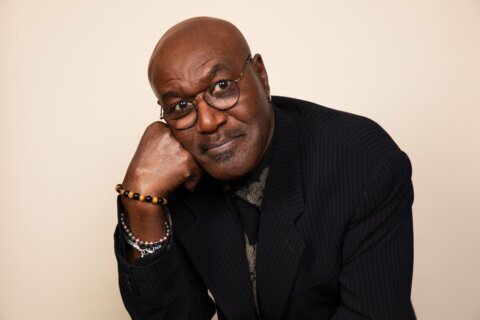WASHINGTON — Since his blockbuster origin story in 2011, Thor has become one of Marvel’s most popular superheroes with his signature red cape, golden locks and magic hammer.
This weekend, Chris Hemsworth scraps all three for a much different take in the lighthearted, candy-colored, uproariously funny “Thor: Ragnarok,” arguably the best standalone “Thor” yet.
“So much has happened since I last saw you,” Thor admits, having learned that his brother Loki (Tom Hiddleston) isn’t dead but rather posing as their father Odin (Anthony Hopkins). The family squabble escalates when their older sister Hela, Goddess of Death (Cate Blanchett), invades Asgard hoping to spark a cataclysmic superhero Armageddon known as “Ragnarok.”
Unfortunately for the Asgardians, Thor is helpless to stop Hela, having been sidelined and immobilized by boozy bounty hunter Valkyrie (Tessa Thompson) and imprisoned in a deadly gladiator arena run by The Grandmaster (Jeff Goldblum). It’s here that Thor is pitted against his old “frenemy” The Incredible Hulk (Mark Ruffalo), cheered by legions of Hulkamaniacs. Can the Avengers make nice and form a new team of “Revengers” to take back Asgard? Hell yeah.
Jeff Goldblum is wonderfully bizarre as The Grandmaster, moving with quirky body language, speaking in incomplete sentences, and appearing in giant holograms to his people like Caesar at the Roman Colosseum. Imagine Joaquin Phoenix in “Gladiator” (2000) only with Goldblum’s signature speech pattern: “Are you not…uh…entertained? Is this not…uh…why you are here?”
As for the rest of the cast, Cate Blanchett has a hella-good time as Hela, rivaling Angelina Jolie’s horned “Maleficent” (2014) with her own set of black antlers — “how wonderful.” Tom Hiddleston is deliciously mischievous as Loki, Idris Elba is a rustic revolutionary as Heimdall, and Tessa Thompson is badass wielding weapons and chugging booze as Valkyrie. She’ll drink to the dregs, slap a taser on your neck, pump you with volts, wipe her mouth and carry on.
Still, the best scenes come between Hemsworth’s Thor and Ruffalo’s Hulk, turning their bickering into laugh-out-loud banter with the type of ball-busting that old friends enjoy:
THOR: “We’re the same, you and I, just a couple of hot-headed fools.”
HULK: “Yeah, same. Hulk like fire. Thor like water.”
THOR: “Umm, we’re kind of both like fire.”
HULK: “Yeah but Hulk like raging fire, Thor like smoldering fire.”
Such banter marks a different direction for Thor, which formerly limited its laughs to fish-out-of-water situations. In “Ragnarok,” the comedy is more akin to “Guardians of the Galaxy” (2014) with a Led Zeppelin “Immigrant Song” fitting for an Awesome Mix-Tape. It sounds odd on paper, but it’s actually a refreshing shift considering this is Thor’s fifth movie in six years.
Hats off to director Taika Waititi, who burst onto the scene with the Oscar-nominated short “Two Cars, One Night” (2004) before winning the Audience Award at AFI Fest with “Boy” (2010). In “Ragnarok,” he keeps things moving with a few clever artistic flourishes — such as following the perspective of Thor’s hammer as it mows down baddies in the opening sequence. What’s more, he makes a killer cameo as the rock creature Korg, who casually spits gallows humor.
If there’s anything to nitpick it’s that the film runs a little long, building to a final bridge battle packed with over-the-top CGI explosions and a Surtur savior of deus ex machina. Thankfully, screenwriters Eric Pearson, Craig Kyle and Christopher Yost mitigate this by setting up the fiery demon Surtur in the opening scene, so that it thankfully doesn’t come out of nowhere.
Granted, a lot of elements do come out of nowhere if you haven’t seen the preceding movies, which has always been the flaw of the Marvel franchise. Major characters suddenly appear for cameos (i.e. Dr. Strange) only to disappear for the rest of the movie. This scattershot style is, of course, a complaint against the overall franchise formula rather than anything from this particular movie. In fact, given the constraints, the film does a fine job of reinvention.
Amidst certain Armageddon, the film finds a touching theme: Asgard is a people, not a place. A superhero is an idea, not a cape, allowing Thor’s heroism to transcend his hammer. Thus, Korg diagnoses all you purists: “Sounds like you had a pretty special and intimate relationship with this hammer and that losing it was almost comparable to losing a loved one.”
In other words, if you’re upset at the hammerless change in direction, behold Odin’s sarcasm: “What are you, Thor, God of Hammers?” Nah. It’s time for the God of Thunderous Laughter.









